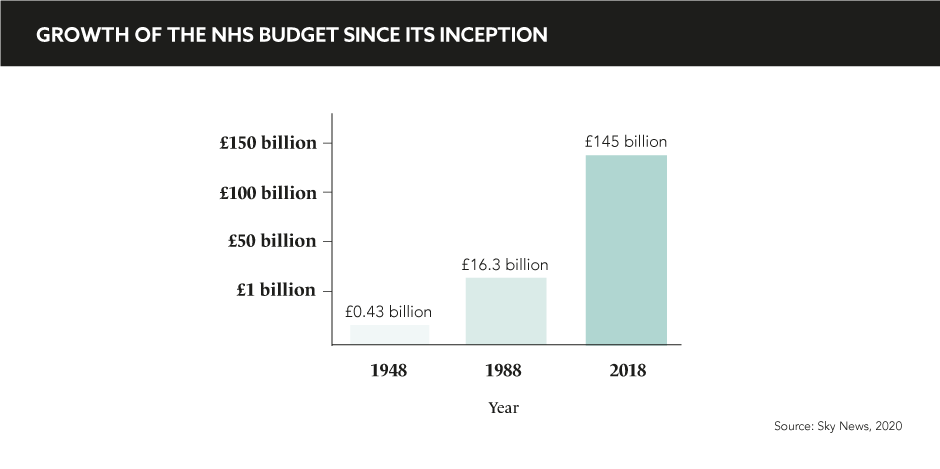Words by Kirstie Turner
The zebras in Sub-Saharan Africa and the native oxpecker birds have one thing in common: an innate desire to survive. The pair have formed a symbiotic relationship, where the birds eat ticks inhabiting the zebra’s skin and, in return, fly above the herds and let out warning calls when danger is near. The animals rely on one another to survive. The pharmaceutical industry’s relationship with the NHS, while lacking in warning calls and ticks, shares the same principle: a common goal that is expedited by working in symbiosis. Just as for the fauna of Africa, there are ever-threatening challenges for the ecosystems of healthcare around the world, from ageing populations and rising costs to the COVID-19 pandemic. Can pharma further cultivate this partnership to create fruitful outcomes for all?
Benefits from collaborating with the NHS are almost boundless
The pharma industry is one of the most powerful entities in the world and it can have a considerable impact on advancing the capability and reach of the NHS in the UK. Ben Osborn, Managing Director, Pfizer UK, says: “For the NHS to deliver the scale and pace of change in the system, strong partnerships will be essential. Although industry is only one part of this combined effort, we have the tools and expertise to really help.”
When forming any longstanding partnership, beginning with a common goal is critical for success. Blake Dark, Commercial Medicines Director, NHS England, makes the point: “Any collaboration should be based on a common goal to improve the lives of patients who rely on the NHS. So long as the shared objectives are in place, benefits from collaborating with the NHS are almost boundless.”
Colette Goldrick, Director, NHS Engagement Policy, ABPI, concurs: “Making partnerships work depends on agreeing a shared objective and committing the resources to make it happen, with both partners delivering what they promise.” When this falls into place, the opportunities for success are vast.
Healthcare is, by nature, a highly regulated ecosystem, which can make collaboration seem more complex. However, Goldrick explains how this can actually boost the opportunity for success: “Prospective partners are often daunted by what they perceive to be regulatory constraints. There is a wealth of guidance and regulation on cross-sector working, like the ABPI Guide to Cross Sector-Working, the Code of Practice and NHS England’s Conflict of Interest Guidance. However, it’s designed to enable partnership, not to inhibit it. Transparent, well-governed partnerships not only have a greater chance of success, but also help build confidence across the system to replicate their success.”
Earlier this year, when the COVID-19 pandemic hit, the need for successful and trusted collaboration grew inordinately. Dark says: “Over the past few months, the response to COVID-19 has shown how effective collaboration between the NHS and the pharma industry can be. Working closely with the NHS, companies have been ready to turn research efforts towards a potential vaccine and explore how established medicines may support patients with COVID-19.” Without already having solid relationships built, it may have been more challenging to work cohesively during this challenging period.
But instead, the pair were able to pool their respective resources. Some pharma companies even sent their staff to help the NHS fight back in its most desperate hour. Goldrick says: “We have come together during this extraordinary period to tackle coronavirus, launching trials to investigate existing therapeutics and collaborating with NHS experts in the search for a potential vaccine. We’ve also seen doctors and scientists from industry volunteering to help out with the extra burden.” This unique relationship has been nurtured, allowing the pair to rely on one another to best serve their patients, no matter the circumstances.
There is scope for progress in partnerships between the NHS and industry, not just in the launch of new drugs, but also in generics and biosimilars, as illuminated during the pandemic. “While securing access to new, branded medicines is often in the spotlight, the NHS Commercial Medicines Directorate is also responsible for generic and biosimilar medicines. Generic medicines make up three-quarters of all medicines used in the NHS and the use of some of these older generic drugs for the treatment of COVID-19 highlights just how vital they are,” reiterates Dark.
Ultimately, cultivating pharma’s relationship with the NHS should be a no-brainer, as the industry develops the drugs to help patients, and the health service uses these tools to provide the best care and outcomes possible. While the pandemic has highlighted the necessity of partnerships, we must learn from this time. “If anything, the pandemic has shown us how we can come out of this crisis stronger. Now we need to work hand-in-hand to not just get back to normal, but to make the most of what we have learnt about collaboration over the past 6 months and apply them more broadly across the health service,” adds Goldrick.
The response to COVID-19 has shown how effective collaboration between the NHS and the pharmaceutical industry can be.
With a flexible and engaging relationship that produces tangible value, pharma and the NHS have had a significant, positive influence on the lives of many patients. However, there is room for this partnership to blossom further. Dark advises: “Global companies that empower staff who hold the local knowledge – the UK General Managers and their teams – will find it far easier to collaborate with the NHS.” With a focus on improved knowledge, open channels of communication, and a clear, defined goal, pharma and the NHS have the potential not just to survive, but to truly thrive.










